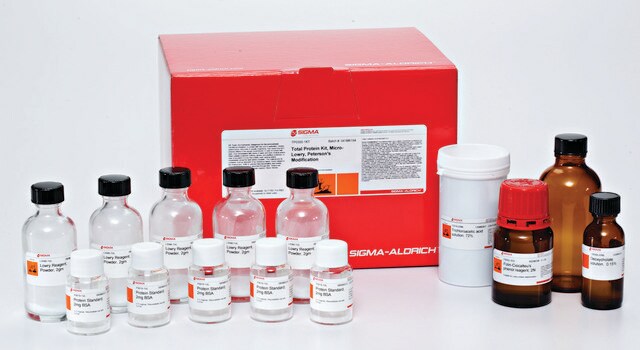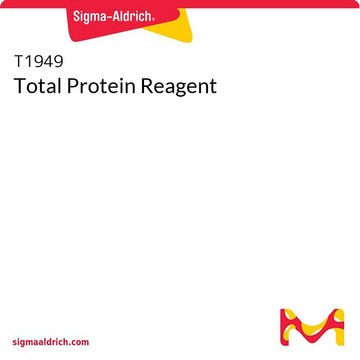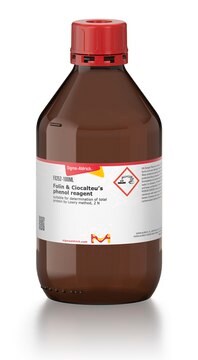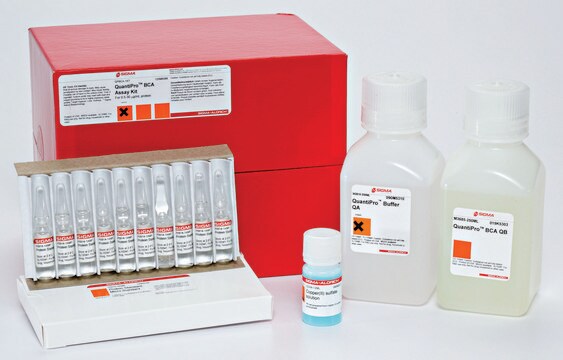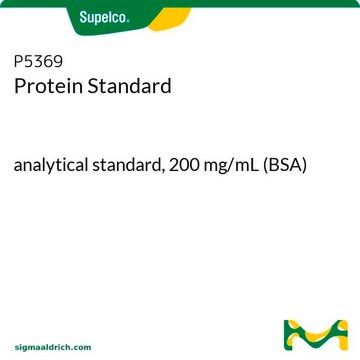TP0200
Total Protein Kit, Micro-Lowry, Onishi & Barr Modification
sufficient for ~50 manual assays
Synonyme(s) :
Total Protein Assay Kit
Se connecterpour consulter vos tarifs contractuels et ceux de votre entreprise/organisme
About This Item
Code UNSPSC :
12352202
Nomenclature NACRES :
NA.32
Produits recommandés
Description
wavelength 500-750nm
Niveau de qualité
Utilisation
sufficient for ~50 manual assays
Plage de mesure du seuil de détection de la protéine
0-1 mg/mL
Paramètres
18-26 °C temperature
200 μL sample volume
Température de stockage
2-8°C
Description générale
The biuret and Lowry procedures are used for protein determination. The former is widely used for clinical assays. The latter, though more sensitive, is used for investigative work and is limited by poor stability of combined reagents, non-reproducibility of color, especially at low protein concentration, and nonlinear chromogenic response with protein concentration. Ohnishi and Barr modified the biuret reagent for the Lowry procedure, thereby simplifying it while improving the stability of the combined reagent.
Application
Total Protein Kit, Micro-Lowry, Onishi & Barr Modification has been used to determine total soluble protein concentrations:
- in the dialyzates/extracts of gliadins
- in the extracts of flour (Avena sativa and Triticum durum) and seeds (Chenopodium quinoa, Salvia hispanica L.)
- in the stored samples of rat liver microsomal fractions
Principe
Colorimetric, Endpoint.assay. Ohnishi and Barr′s modification of micro Lowry method. According to procedure, dilute biuret reagent reacts with peptide bonds to yield a purple-blue complex, the color of which is intensified by the addition of phenol reagent. Absorbance, read at 550-750 nm, is used to determine results from a standard curve.
Composants de kit également disponibles séparément
Réf. du produit
Description
FDS
- B3934Biuret reagent, protein detection level 150-1,000 μg/mL 110 mLFDS
- Folin & Ciocalteu’s phenol reagent 5 mL
Nécessaire, mais non fourni
Réf. du produit
Description
Tarif
Mention d'avertissement
Danger
Mentions de danger
Classification des risques
Eye Dam. 1 - Met. Corr. 1 - Skin Corr. 1
Code de la classe de stockage
8A - Combustible corrosive hazardous materials
Point d'éclair (°F)
Not applicable
Point d'éclair (°C)
Not applicable
Faites votre choix parmi les versions les plus récentes :
Déjà en possession de ce produit ?
Retrouvez la documentation relative aux produits que vous avez récemment achetés dans la Bibliothèque de documents.
Les clients ont également consulté
Inge Everaert et al.
American journal of physiology. Renal physiology, 318(4), F1030-F1040 (2020-03-10)
Manipulation of circulating histidine-containing dipeptides (HCD) has been shown to affect the development of diabetes and early-stage diabetic nephropathy (DN). The aim of the present study was to investigate whether such interventions, which potentially alter levels of circulating HCD, also
A Kaliszewska et al.
Food and chemical toxicology : an international journal published for the British Industrial Biological Research Association, 95, 89-95 (2016-07-06)
Cereal proteins are of clinical interest because of their cytotoxic and immunogenic features being associated to allergic processes and intestinal disorders. In addition to gliadins, there has been suggested an important role for non-gluten modulating factors (nGMF) on the onset
Fei-Fan Cai et al.
Journal of biomedical materials research. Part B, Applied biomaterials, 109(8), 1090-1104 (2020-12-06)
The concept of adding inorganic fillers into hydrogels to form hydrogel nanocomposites often provides advantageous properties which can be exploited for successful 3D biofabrication. In this study, a new composite hydrogel combining oxidized alginate-gelatin (ADA-GEL) hydrogel and Laponite® nanoclay as
Method for Detecting NADPH-Cytochrome P450 Reductase in Liver Microsomal Fractions by Using Native Polyacrylamide Gel Electrophoresis and NADPH-Diaphorase Staining
Yokoyama H, et al.
American Journal of Analytical Chemistry (2013)
A Smialowska et al.
Journal of dairy science, 100(4), 2553-2563 (2017-02-22)
We isolated goat phosphopeptides via calcium and ethanol precipitation from a caseinate digest and investigated their feasibility as an iron-fortification ingredient in nutritional foods. Goat tryptic-digested phosphopeptides could bind 54.37 ± 0.50 mg of Fe/g of protein compared with goat
Notre équipe de scientifiques dispose d'une expérience dans tous les secteurs de la recherche, notamment en sciences de la vie, science des matériaux, synthèse chimique, chromatographie, analyse et dans de nombreux autres domaines..
Contacter notre Service technique